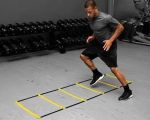Tips to Improve Your Fitness Performance
As someone who's been working on improving my fitness for years, I’ve learned that it’s not just about working out harder; it’s about working out smarter. Over time, I’ve found that small adjustments to my routines and lifestyle can have a big impact on my fitness performance. Whether you're a beginner or an experienced athlete, there are proven strategies you can incorporate into your fitness regimen to see better results and make progress more efficiently.
1. Set Clear and Achievable Fitness Goals
One of the first things I learned in my fitness journey is the importance of setting specific, measurable, achievable, relevant, and time-bound (SMART) goals. It’s easy to get overwhelmed if you don’t know where you’re headed, which is why I always start by breaking down my long-term fitness ambitions into smaller, more manageable milestones.
For example, instead of setting a vague goal like "get fitter," I’ve learned to make it more specific: "Increase my squat max by 20 lbs in three months." This approach has helped me stay focused and motivated, and it also allows me to track my progress. SMART goals are particularly effective because they push you to reach new levels without feeling like you're taking on too much at once.
2. Focus on Proper Nutrition
Nutrition has had a massive impact on my fitness performance. Early on, I didn't fully understand how what I eat affects my workouts, but over time, I realized that the right nutrients are crucial for fueling my body, aiding recovery, and preventing injuries.
For instance, I’ve found that consuming protein-rich foods after a workout helps with muscle recovery and growth. Carbohydrates, especially complex carbs, are vital for energy before workouts, while healthy fats keep my body nourished throughout the day. Staying hydrated is also incredibly important. I aim to drink water regularly, especially before and after exercising, to keep my body performing at its best.
3. Rest and Recovery Are Just as Important as Training
In the past, I used to believe that more training meant better results. But over time, I’ve learned that rest and recovery are just as crucial to improving fitness performance. After all, muscles grow and repair during rest, not while working out. That’s why I prioritize sleep and aim to get at least 7-8 hours per night.
Additionally, I take rest days seriously. These rest days allow my body to recover from intense workouts, reducing the risk of overtraining and injury. I've also incorporated activities like yoga and stretching to help with flexibility and mobility, ensuring I stay injury-free while improving my performance.
4. Mix Up Your Workouts for Better Results
If there’s one thing I’ve discovered about fitness, it’s that variety is key to continued progress. Doing the same exercises week after week not only gets boring but also leads to plateaus in progress. That’s why I make a conscious effort to switch up my routine regularly.
For example, I alternate between strength training, cardiovascular exercise, and flexibility exercises to keep my body challenged in different ways. I also experiment with new activities like HIIT (high-intensity interval training) or different styles of yoga. This keeps my workouts interesting and helps improve different aspects of my fitness, from endurance to strength to flexibility.
5. Incorporate Strength Training into Your Routine
Strength training has been a game-changer for me. I initially started focusing mainly on cardio, but once I added strength training to my routine, I saw a major improvement in both my muscle definition and overall strength. Not only does strength training help increase lean muscle mass, but it also boosts metabolism and improves functional strength for daily activities.
I began with basic bodyweight exercises like squats, push-ups, and lunges, and gradually worked up to lifting weights. It’s been incredibly rewarding to see my strength increase over time, and I feel more confident in my fitness abilities. Even if your primary goal is weight loss or endurance, strength training is a great way to complement those objectives.
6. Use Technology to Track Your Progress
Technology has become an essential part of my fitness journey. I use fitness trackers, apps, and smart watches to monitor my workouts, sleep patterns, and overall progress. These tools give me concrete data that I can use to adjust my routine or set new goals. For example, my fitness tracker helps me track the number of steps I take each day, while my workout app allows me to log each exercise set and track improvements in strength.
By using these tools, I can see exactly where I’m improving and where I may need to adjust my approach. Technology helps me stay accountable and motivated, especially when I can see measurable progress over time. Plus, many apps offer challenges and rewards that keep things fun and engaging!
Conclusion: Stay Consistent and Patient
Improving your fitness performance is a journey that requires consistency, patience, and dedication. It’s not always about working harder; it’s about working smarter by focusing on proper nutrition, recovery, and progressively challenging your body in different ways. By setting clear goals, incorporating strength training, and using technology to track progress, I’ve been able to achieve my fitness goals and continue progressing.
Remember, fitness is a marathon, not a sprint. The results won’t come overnight, but with persistence, you’ll begin to see tangible improvements in both your strength and endurance. Whether you're just starting your fitness journey or looking to take your performance to the next level, these tips will help you stay on the right track to achieving your goals.








